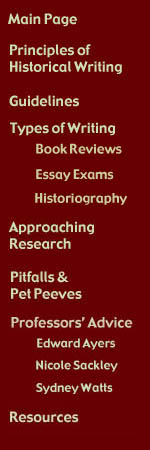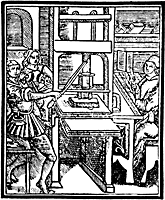

Principles of Historical Writing: Thinking Like an Historian
(printable version here)
As Richard Marius and Melvin E. Page attest in their book A Short Guide to Writing About History, "history and writing are inseparable." How would we know of past events if it they had never been documented? Even the stories and myths of ancient cultures, many of which relied heavily on the oral tradition, were subject to intense transformations after years of repetition. Writing, therefore, is what propels information and ideas into permanence, or what are customarily referred to as 'the annals of history."

A representation of the Gutenberg Printing
Press, 15th century, which forever revolutionized the
dissemination of information.
Still, writing about history requires careful scrutiny. This is not to say that historical writing is particularly difficult or complicated, but it does require thought processes that some may be unaccustomed to. Indeed, unique questions must be considered, and the first step to answering such questions involves thinking as an historian. Outlined below are seven principles of historical thinking and writing that, if followed, will ensure that your mind is on the right track.
1. Take the time to think and prepare
2. Place yourself in the times
3. Careful consideration of evidence and viewpoints
4. Focus your topic
5. Be open to the possibility of having to change your topic
6. Mind your audience
7. Avoid restating others' ideas--add personal value
I. Take the time to think and prepare
When preparing to write for a history course, do not simply rush into the writing process! Dr. Hugh West, chair of the history department, finds that many students underprepare for their writing assignments. When considering an idea or ideas that you'd like to explore, think ahead. Ask yourself, is my proposed idea or argument feasible? What obstacles might I encounter during the writing process? Should I research more about my topic?
As you consider such questions, be sure to organize your thoughts on paper before you begin writing. Different strategies work for different people--some prefer writing complete and detailed outlines, while others prefer 'blocking' their ideas together in a web of interrelated concepts. However you would like to approach this, be sure to write down new and useful ideas as you think of them. Don't let them escape your immediate attention by turning to another point...write them down!
II. Be mindful of the time period about which you are writing
On the home page of this writing handbook lies a quotation from Francis Parkman which stresses the importance of being aware of the contemporary context of the time period about which you are writing. For example, when rationalizing or explaining the actions of past individuals, it is important to take into account the standards of thinking and prevailing ideologies of the times. As Parkman suggested, a writer must become a "sharer or spectator of the action that he describes."
Be sure to keep in mind the essential questions
- Who? Who were the principal actors in a given event or time period?
- What? What was being acted upon? What was at stake?
- When? When did it occur? More importantly, in what order did things occur? What events led to others?
- Where? Where did it occur? What groups of people were involved and where did they reside?
- Why and, more importantly, How? These are the classic and ultimate questions that historians ask. Why and how did things happen as they did? In the words of Dr. John Treadway, the analysis of history is analogous not to a simple description of 'the watch', but of the 'watch mechanism'.
This principle also concerns the use of voice. In general, when writing in history, the use of the past tense is preferred.
III. Carefully consider evidence and viewpoints
Evidence is what legitimizes your prose. In acquiring such evidence, be sure to:
- Consider a variety of resources, including both primary and secondary sources
- Always consider opposing viewpoints. Consider which arguments could be used against yours, and how you can refute them.
- Avoid being selective; be open to whatever discoveries you may find when acquiring evidence; don't pass up an argument simply because it does not follow your previous ideas.
- Document evidence as you acquire it...you never want to have to go back through your paper after the fact and search for the page numbers for which you need citations.
- Explain the significance of the evidence that you present. Dr. West notes that the use of evidence in history differs from the social sciences--it is often spotty, does not speak for itself, and requires careful explanation.
The consideration of evidence, and the best ways of approaching it, will be discussed in further detail in the next section.
IV. Develop a focused, limited topic
There is such a wealth of knowledge throughout history that focusing your topic is essential to performing reasonable historical analysis. Often, historians utilize specific, focused research to answer broader topics.
For example, you might be interested in researching Winston Churchill, but entire books have been published analyzing Churchill's life and actions. Instead, you might narrow your focus toward Churchill's leadership during World War II. Even then, you may find that your topic is too broad. You might narrow it even further by focusing on Winston Churchill and his policy towards a particular country or region in World War II. You might be surprised to find the wealth of information that would be available to you.
V. Be open to the possibility of having to change your topic
In the course of performing your research, keep in mind that you may have to refocus or realign your topic or thesis as you delve further into sources. If you find evidence that seems to contradict the argument that you intend to make, it would be better to alter your argument to take that new information into account than it would be to ignore it and move forward with your original argument.
This principle is particularly true in cases where personal biases might tend to dictate one's aims in writing. Attempt to rid yourself of partial or biased opinions when approaching a topic for research. Dr. Treadway stresses that the goal of a historian should be to tell, ostensibly, what happened objectively. Objectivity, therefore, is of paramount importance when considering evidence.
Historians must keep their audience in mind when writing. In the case of undergraduate students, in particular, keep in mind that you are writing a paper to be turned into a professor who has likely outlined very specific expectations. If you are ever unsure of something regarding an assignment, contact the professor, don't simply assume that one way is to suffice over another. Keep the following ideas handy when "minding your audience":
- Often professors will frown upon a simple 're-telling' of an event or time period. Unless specifically stated otherwise by the professor, your analysis and interpretation should take precedence over your re-telling of a sequence of events.
- Despite the above point, always be certain to define particular terms. Although you are often writing for a professor that will be familiar with such terms, you will reinforce the logical progression of your paper by defining important terms and ideas as you write.
- Pay particular attention to your professor's expectations for citing and referencing sources; improperly cited work can result in allegations of plagiarism and, if accused at the University of Richmond, to be brought before the Honor Council.
VII. Avoid restating others' ideas--add personal value
While the consideration, and sometimes reiteration, of the thoughts and ideas of other authors is extremely useful, a history student should always strive to add a personal element to their argument. This may seem like a daunting task... you may ask, "how am I to come up with an idea which professional historians have not yet written of?" Yet this process is not as difficult as it may seem. Take the time to acknowledge the arguments that others have made, but also look for new connections, relationships, or subtleties that may be relevant to the topic about which you are writing.
Dr. Eric S. Yellin offers particular advice with regard to this principle:
"Be creative. Look over your sources and then find interesting or surprising connections among them. Never regurgitate or summarize: look for the hidden truth or the unusual thread. Historical interpretation can be a creative endeavor if you learn to combine facts and evidence with imagination."
Other Disciplines | Writer's Web | Writing Center | Make
an Appointment | Library | History Department
Copyright Info